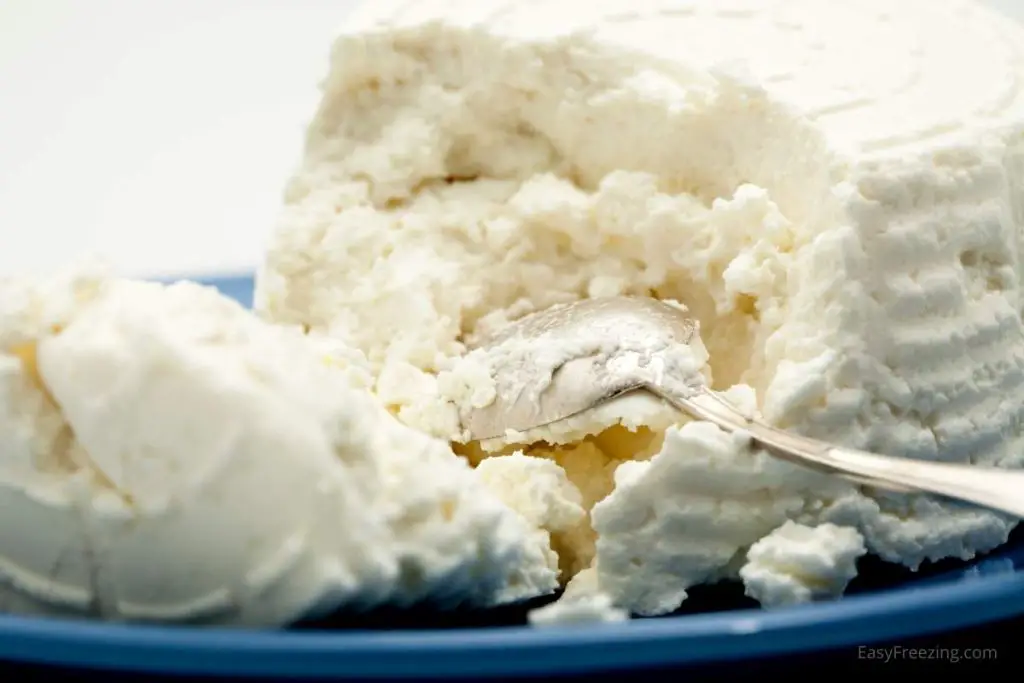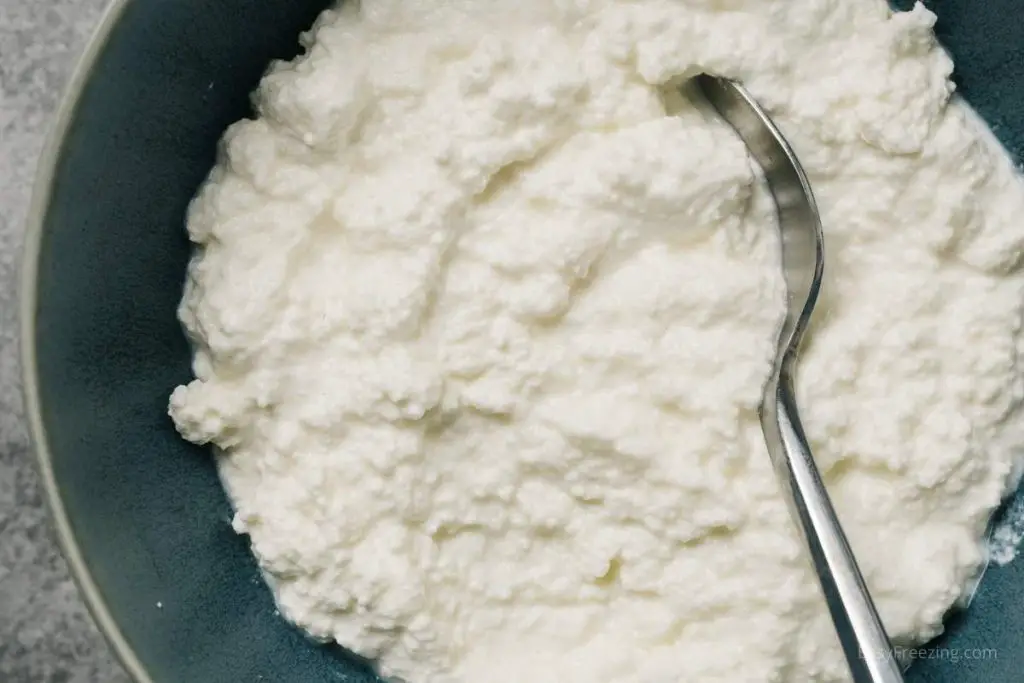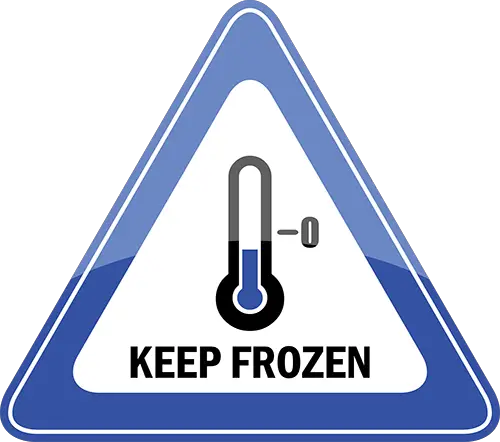Can You Freeze Ricotta Cheese? (YES! Here’s How)
Are you wondering if you can freeze the ricotta cheese in your refrigerator freezer to keep it fresh for longer?
You can freeze ricotta cheese, but due to its high water content, the texture of ricotta is very different once it has thawed. For this reason, it’s best to use frozen ricotta cheese baked into recipes rather than as an unbaked topping. Frozen Ricotta cheese is best if used by the 3-month mark.
Ricotta cheese is a delicious, creamy cheese that is a staple in many Italian dishes like lasagna. It is considered a whey cheese made from the byproducts of other dairy products made from sheep, goat, or cow milk. If you have a recipe that only calls for a little bit of ricotta, it makes sense to freeze the rest to be used at a later date.
In this article, I will discuss whether you can (or should) freeze ricotta cheese, how to do it, and how to use it once it’s thawed.

Can You Freeze Ricotta Cheese?
There’s nothing worse than having to throw out a barely used tub of ricotta cheese because you used it in one recipe, but don’t have plans to use it again anytime soon. If you can’t find a container of ricotta that is small enough for your recipe, you’ll be relieved to know that you can freeze the leftover ricotta to use another time.
Ricotta isn’t a great cheese to freeze because it has a very high water content, but it can be done. The liquid in ricotta cheese will separate out during the freezing process and freeze separately as ice crystals on the frozen cheese.
When frozen ricotta is defrosted, it tends to be a bit runnier than fresh ricotta would normally be. For this reason, it’s recommended to only use ricotta that you have frozen in recipes where it is baked in.
If you use your ricotta as a topping or in a recipe that doesn’t require baking, you may not get the desired effect you’re looking for. It’s perfectly fine to eat, but it might not be the same consistency you’re used to with fresh ricotta cheese.
How Long Is Ricotta Cheese Good In The Freezer?
Although ricotta cheese can be frozen for future use, don’t bury it deep in your freezer and forget about it. As with most foods, there is a time limit on how long you should leave frozen ricotta in your freezer before you defrost and use it.
Fresh ricotta cheese can be frozen for up to 3 months. Make sure to freeze your ricotta before the expiration date and check to see if it smells fresh before you freeze it to make sure that it will be good to use when you defrost it in the future.
How To Freeze Ricotta Cheese (Easy Guide)
To ensure that your frozen ricotta cheese holds up well until you need to use it, there are some things you should do. By properly packaging your ricotta cheese, you can make sure that the ricotta cheese you put away will be ready to use for your next new recipe.

Here are some of the best ways to make sure your ricotta cheese survives its time in the freezer:
Remove As Much Moisture As You Can
Ricotta is a very watery cheese, so there is usually a layer of water floating on top of the ricotta. Even if you don’t see a separate layer of water, if you press down on the top of the ricotta cheese you will notice water coming out of the “pores” in the ricotta.
This water will separate from the cheese and become an icy slush during the freezing process. The more water you can get out of your ricotta before freezing, the better. Having less water will help the ricotta retain as much of its original properties as possible once its defrosted.
Place The Ricotta In An Airtight Container
The key to making sure your ricotta stays fresh tasting even after being frozen is to remove all the air from the container prior to freezing. This is a good practice with any frozen foods, and ricotta is no different.
For best results, wrap your ricotta in a layer of plastic wrap or parchment paper. Make sure it’s wrapped tightly with no room for air. Once it’s wrapped tight, place it in a freezer bag or stasher bag and push all the air out before sealing it. These two layers of protection will help your ricotta freeze well and avoid freezer burn.
Freeze Ricotta In Single Use Sizes
An alternative way to store ricotta, and many other things that you may only need a little bit of at a time, is to freeze it in small quantities. This makes sense for many because that is how you most likely got here in the first place. There’s nothing worse than defrosting an entire container of ricotta for just a scoop or two.
You can freeze ricotta in jumbo-size ice cube trays and pop out the cubes and store them in an airtight container for times when you may only need a few tablespoons of ricotta for your recipe.
Can I Freeze Ricotta In The Original Container?
If you have an unopened container of ricotta that is nearing its expiration date, it’s easy to assume you can just freeze it right in the container. That seems like an easy solution, but it might not have the outcome you were expecting.
One of the big issues that this presents is that most ricotta cheese is sold in flimsy plastic containers that are not made to be frozen. When the liquid in the container as the ricotta freezes, it might break or crack.
Freezing ricotta in the original container also does not allow you to take the liquid off the top of the ricotta cheese, which is an essential step in freezing ricotta properly.
How Can I Tell If Ricotta Cheese Is Bad?
It’s easy to tell when most dairy products have gone bad due to the odor that they emit, but ricotta cheese is a little bit different. Ricotta is a very mild cheese that does not have much of a smell naturally, so it can be difficult to tell whether it has gone bad or not.
Ricotta cheese does smell sourer when it has gone bad, so if you are unsure whether your defrosted ricotta has gone bad it’s always a good idea to give it a sniff. Make sure to date the bag before you put your ricotta in the freezer so you can try to use it before the expiration date.
How Do I Defrost And Use Previously Frozen Ricotta?
It’s important to know that there is a right and a wrong way to defrost and use your frozen ricotta.

The most important thing to do is make sure you give yourself enough time to defrost your ricotta before you need to use it. You should take your ricotta out of the freezer and place it in the fridge 5-6 hours before you need to use it. This should allow it to come to temperature slowly and safely so that it’s the right consistency to cook with.
As tempting as it may be, do not take your ricotta out and put it on the counter to let it defrost at room temperature. This is how bacteria tend to grow, so it’s very important not to do this even if you are pressed for time.
Once the ricotta is fully defrosted, drain or soak up the additional water with a paper towel. The texture will be a bit more watery than fresh ricotta, so it’s suggested that you use defrosted ricotta right away before the texture gets even runnier.
Can You Freeze Ricotta Cheese – Summary
Ricotta cheese is a delicious, creamy, savory addition to countless recipes. There’s a good reason why it’s a fridge staple for so many people. It’s a great pizza topping, an essential ingredient in most lasagnas, and makes pancakes extra fluffy.
There are plenty of ways to use this unique whey cheese, but if you find that you have more ricotta than you need you can always freeze it to be used at a later date. This is a big relief for anyone who has ever thrown away an expired container of ricotta with only one scoop taken out of it that you found in the back of your fridge.
Ricotta isn’t hard to freeze, but it’s important to do it the right way to make sure you get the best results. Remove as much of the excess water as you can and place your ricotta in an airtight container.
You can freeze it as a solid block or in small single-serve size cubes for ease of use if you prefer.
To defrost your ricotta, place it in the fridge (NOT on your counter) 5-6 hours before you need to cook with it. There will be additional water from the defrosting process, so it’s important to drain that off before you use it to help preserve the integrity of the ricotta’s texture.
Ricotta can be frozen for up to 3 months in perfect conditions, but always remember to give it a quick sniff test once it’s defrosted before you use it. If it smells sour or “off”, it’s best to toss it and pick up some fresh ricotta for your recipe instead.







